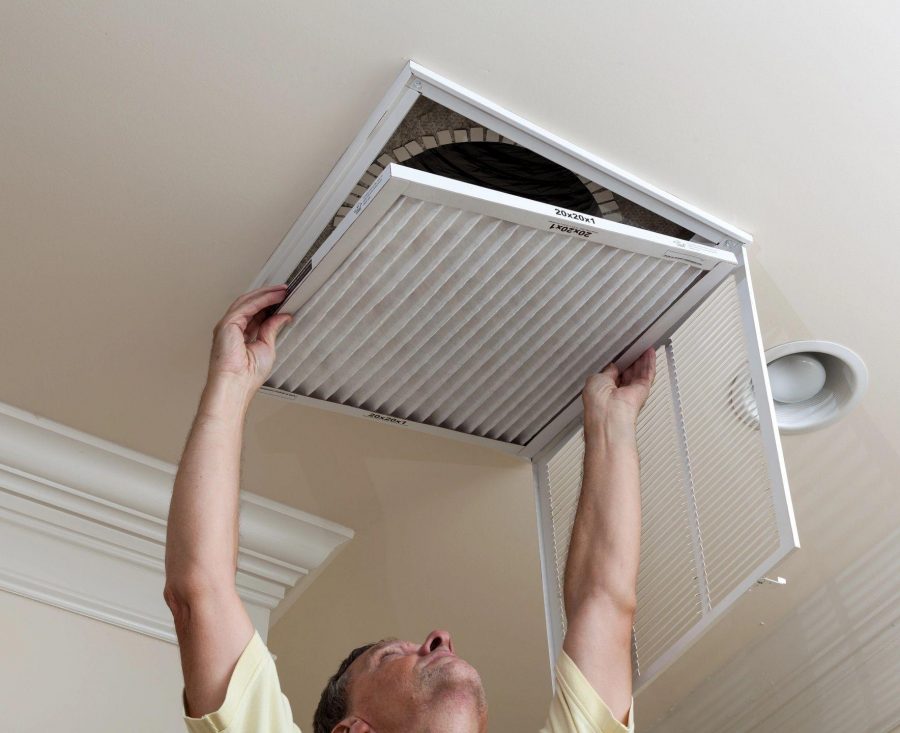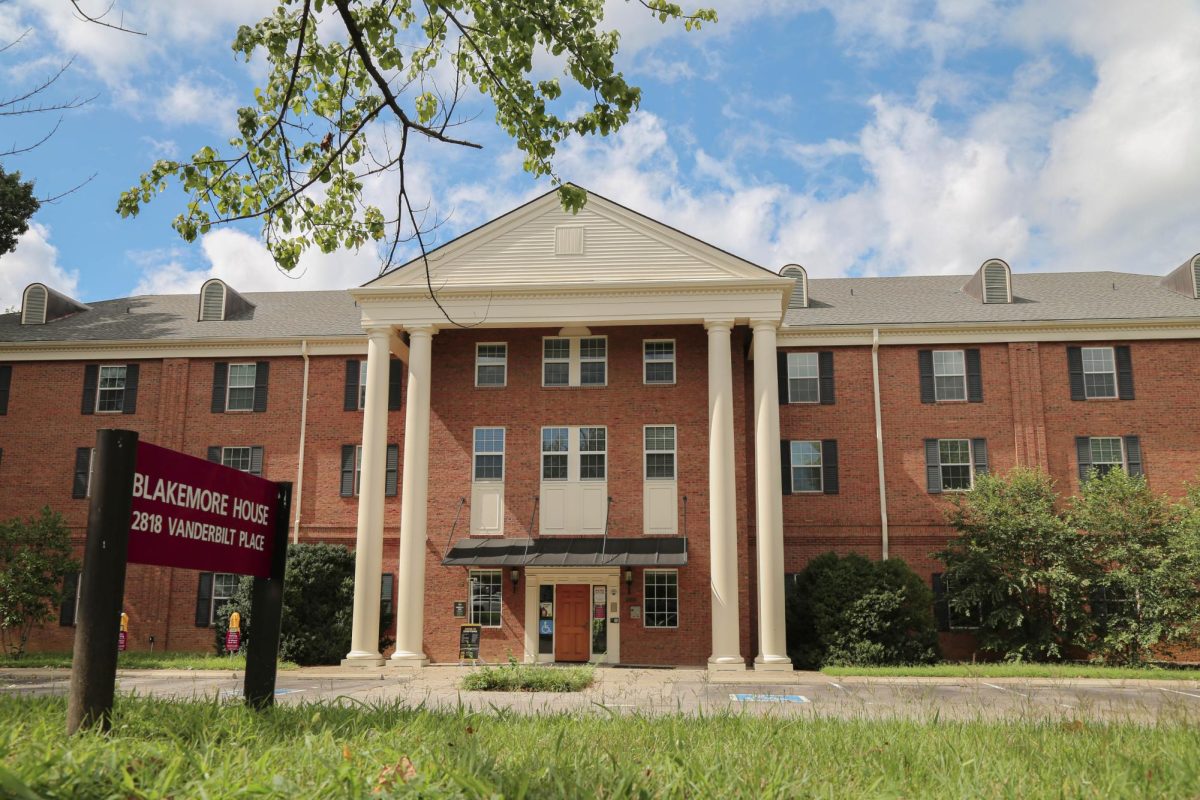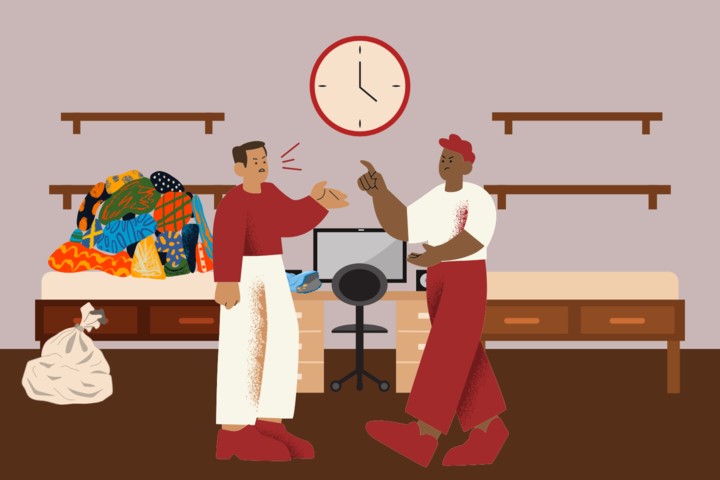CORRECTION: An earlier version of this story stated that a student was hospitalized due to mold concerns. The student visited the emergency room but was not hospitalized. The Hustler has corrected this error.
Several students have reported cases of mold in the McTyeire and Blakemore houses over the past several months. According to McTyeire resident Chiaki Santiago ‘19, she began experiencing health issues as a result of the mold almost immediately after moving into her dorm last semester.
“After the first two nights, I began to develop an intense cough, getting up in the middle of the night and not being able to fully sleep through the night. I couldn’t shake it, and I summed it up to the typical Vandy plague.”
Santiago noticed that the air in her dorm was damper and mustier than the previous years that she had lived in McTyeire, and after a few weeks, she noticed mold growing in her dorm.
“I realized that most of the items that I had left on my desk that I don’t use daily and some leather items on my dresser had mold growing on them, in large or in small portions… Disgusted, I immediately contacted maintenance and put in a maintenance report.”
She surmised that her health problems over the past few weeks likely stemmed from the mold, and decided to apply to switch dorms.
“After consulting my parents, they thought it would just be best to move out of the dorm entirely, especially if I felt that the moisture and circulation of air was unhealthy throughout the dorm. I filed to be moved out. Regardless if they could clean the mold from my room, I wanted to be rid of a dorm that had mold growing on main air vents and had a clear mold problem.”
Despite mounting evidence of mold and the health issues it caused, Santiago was met with much resistance from housing over her switching dorms. Rather than allowing her to move, her program coordinator responded by sending a maintenance team to clean her room.
“Maintenance came, brought in a dehumidifier, cleaned my air vent with a cloth that they had littered onto my bed multiple times, and had told me that someone would come clean the walls in my room. That promise was not fulfilled, and no one came to clean the walls or furniture in my room. While the air in my room became drier and felt somewhat better, my cough wouldn’t go away.”
“I tried to follow-up with maintenance, but they kept putting a pink slip on my door saying that there was no apparent mold in my room. They said that the humidity was not conducive for mold growth, and that there are no visible signs of mold. Every time I entered my room, I checked to see if they wiped down my walls. I had a feeling that they wouldn’t uphold their promise, so I put an Expo marker mark on my wall in the beginning when they first made their promise, that can be readily taken off with the swipe of a hand, and it has yet to be cleaned.”
Despite her ongoing efforts, Santiago’s dorm continued to affect her health, to the point that her constant coughing caused her to injure her back.
After the discussion, he told me to immediately move out of where I was living and wrote me a note to do so.
“I went to the ER, in excruciating pain, and a doctor informed me that I had a herniated disc. He noticed my intense cough, and had noted that the added stress of coughing put a lot of strain on my back, and was most likely a factor in causing the herniated disc. He checked my throat, noticed how swollen it was and asked if there were other causes. I had mentioned that there was mold found in my room. He took a swab, tested it, and said that there was clear inflammation from fungus or bacteria, and attributed it to mold. After the discussion, he told me to immediately move out of where I was living and wrote me a note to do so.”
After reporting these findings to her area coordinator and the director of housing assignments and asking to be move to a different dorm, Santiago was met with days of silence. She was then prompted to file with Student Access Services to document her injury and mold allergy. Several weeks after doing so, Santiago was informed that housing could not move out of her dorm.
“She had said that she could not grant my request to move out of the dorm, since I had made a commitment and that I was expected to honor that commitment. I was chastised and told that McTyeire is a specific community, a community that I had served as president and have lived in for 2 years. She also informed me that by losing students, the program of McTyeire is jeopardized.”
Santiago is currently seeking a mold allergy diagnosis and has yet to move dorms.
According to Dr. Louise Hanson, the medical director of the Student Health Center, Nashville’s high humidity during several months out of the year can lead to visible mold on indoor surfaces. However, Hanson states that only those with a mold allergy tend to have strong reactions to mold, and that damage to the lungs is even rarer.

“For most types of mold, only those with allergies tend to react. It’s estimated that this is about 5% of the population…Mold does not usually cause damage to the lungs. There are rare circumstances, primarily during occupational exposures, where high levels of some types of mold can cause inflammation that is harmful to the lungs.”
Several other students in Blakemore have experienced similar issues with varying results from ResEd. One such student, Morgan Wiley ‘21, also experienced health issues due to mold.
“Initially my roommate and I were under the impression that because we didn’t have any physical mold in our room that we were separated from the issue. However, I had been coughing severely for several months, and that’s what incited my mom to contact housing about getting an independent company to come and test the air quality. She was in communication with a man named Jim Kramka who is the senior director of housing operations here at Vanderbilt. He agreed to have the building tested by an independent company (Belfour) in November, but we did not receive the results that there were elevated levels of mold spores in our room until January.”
Wiley’s mother Latonya, a lawyer, also spoke with Kramka after hearing from her daughter about the mold in her room. She was told the process would be taken care of by the in-house mold expert, an employee of the public safety division* in the environmental health and safety department. Still, she believed to adequately address the mold problem, an independent mold remediation team should be brought in to test and fix the problem in her daughter’s room.
“I kept asking the question, ‘Why won’t Vanderbilt, this university with all its smart people, why can’t y’all bring in a mold remediation company, people who specialize in this, who have expertise in the area, and test the air quality for mold?’ You can’t just say it’s gone because you don’t see it. And so after about 45 minutes to an hour of some really harsh conversation, extremely harsh conversation on my part, which I did not want to do, he finally agreed.”
Maintenance cleaned Wiley’s room during fall break and Kramka assured Ms. Wiley that an external company would come to test the room for mold. When her daughter and roommate returned from break, they found their room cleaned but with their belongings tossed around the room.
Then he said ‘However, your daughter’s room has a high degree of powerful mold in it in the air spores.’
“By the time they came back for Christmas, [the air quality test] still had not been done. So last Thursday, he sends an email to me saying ‘We got the testing done, and I’m pleased to tell you that the results are good and I’ll send out communication to the parents,’ which we still haven’t gotten by now. Then he said ‘However, your daughter’s room has a high degree of powerful mold in it in the air spores.’”
Wiley and her roommate were permitted to move into their new dorm this past weekend, and their carpet was laundered by Vanderbilt in order to remove any lingering mold spores. Housing initially told them that their clothes and linens would be laundered for them as well, but later said they would not be able to do so.
According to Assistant Vice Chancellor of Plant Operations Mark Petty, Plant Operations typically tries to close out work orders within seven day, though that number varies based on the nature of the issue. In the case of a mold issue, they usually take a two-step approach to amending issue.
“First we go into the space and we do an immediate remediation of the space. So we use a chemical which, I guess you call it a disinfectant or it’s a biocide, called microband, it’s pretty much the industry standard, it kills what you spray it on. It’s not toxic to us, but it certainly is toxic to fungi and stuff like that. And so we wipe down everything that we can that we see has mold on it. But then our second parallel course to that is to figure out why we get mold, because mold is, for lack of a better term, it’s omnipresent. The spores, I mean if we did a test in here, you’d have mold spores in here, and they’re just, they’re waiting.”
Dorm rooms are typically adequate environments for mold to grow, especially those with an attached or nearby bathroom to provide humidity. Cooling down the buildings with air conditioning also contributes to the issue, as it puts the rooms at an ideal temperature for mold, and allows for water to condensate on the metal on the AC unit and on bedposts. Petty also mentioned that the unusually high amount of rainfall over the past year has likely contributed to the issue.
According to Petty, maintenance typically returns to the sites that have reported mold to ensure that the problem has not returned.
“Area maintenance supervisors, once we’ve identified a situation where there’s mold, the area maintenance supervisors are really good about going back to check on a very routine basis because we do want to eliminate those conditions that have the more systemic issues.”
Ms. Wiley expressed that her frustration lies not with Vanderbilt as a whole or with Kramka himself, but rather with Vanderbilt’s responsiveness to these issues and lack of communication with the parents and students.
“One thing I will say is that I know that it’s a great university and with all of the smart people around, this was something that they could have remedied quite easily. All of my frustration centered around, number one ensuring the safety of my daughter and the residents of her dorm, and that I know that Vanderbilt has a standard of excellence and I just held them to that standard.”
The Hustler reached out to Jim Kramka on Jan. 14 at 12:45 p.m., after this piece was published. We will update readers when the university responds.
*a previous iteration of the article stated that the in-house mold expert was a police officer. This is incorrect; rather, the expert is part of a team housed within the public safety department. The article has been edited to reflect this correction.













shawne stauffer • Apr 13, 2019 at 10:23 am CDT
I am a parent of 2022 student who will be living in this dorm next year. I’m concerned that they have not fixed this issue. Do you plan on keeping up on this article. I know my daughter is not going to complain about stuff to me. Even being there a year she seems to constantly had a cough now. Please stay on top is this issue. It is a high concern.
Alum • Jan 14, 2019 at 11:52 am CST
This sadly isn’t a new problem, back in 2013 I experienced the same problem (constant coughing, multiple trips to student health being told it was “allergies”), and wound up finding mold growing in an air purifier I purchased for the room. Housing refused to do anything, and I ultimately had to see multiple doctors to document a mold allergy and file for disability with the EAD office in order to be allowed to change dorms. Thanks for bringing awareness to this issue… it is long overdue.